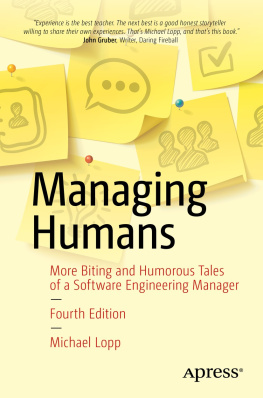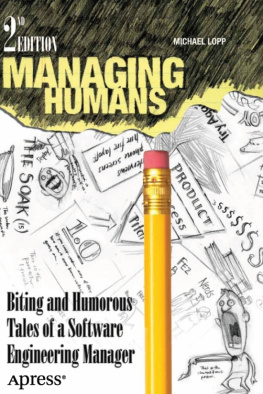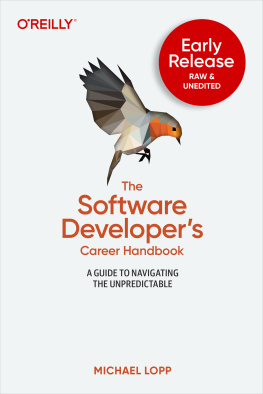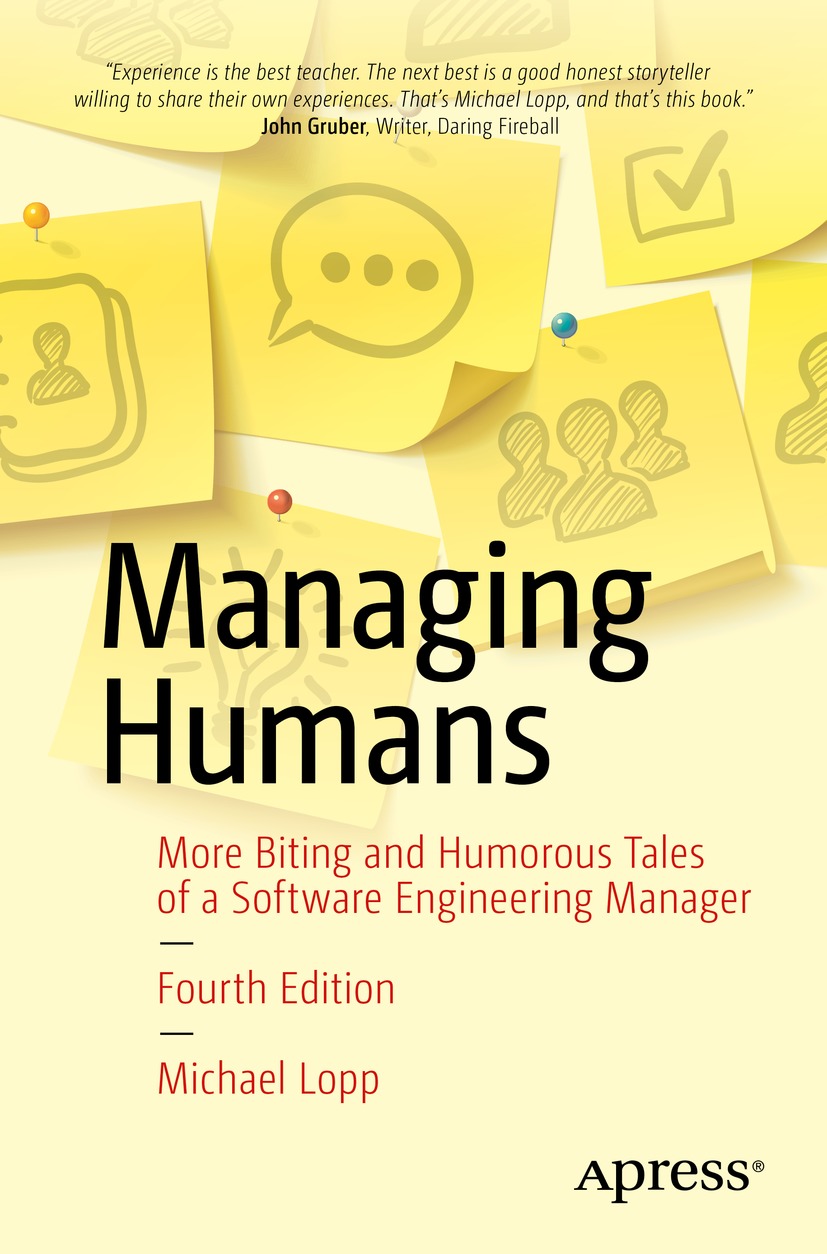Michael Lopp
Managing Humans
More Biting and Humorous Tales of a Software Engineering Manager
4th ed.

Logo of the publisher
Michael Lopp
Los Gatos, CA, USA
ISBN 978-1-4842-7115-5 e-ISBN 978-1-4842-7116-2
https://doi.org/10.1007/978-1-4842-7116-2
Michael Lopp 2021
This work is subject to copyright. All rights are reserved by the Publisher, whether the whole or part of the material is concerned, specifically the rights of translation, reprinting, reuse of illustrations, recitation, broadcasting, reproduction on microfilms or in any other physical way, and transmission or information storage and retrieval, electronic adaptation, computer software, or by similar or dissimilar methodology now known or hereafter developed.
The use of general descriptive names, registered names, trademarks, service marks, etc. in this publication does not imply, even in the absence of a specific statement, that such names are exempt from the relevant protective laws and regulations and therefore free for general use.
The publisher, the authors and the editors are safe to assume that the advice and information in this book are believed to be true and accurate at the date of publication. Neither the publisher nor the authors or the editors give a warranty, expressed or implied, with respect to the material contained herein or for any errors or omissions that may have been made. The publisher remains neutral with regard to jurisdictional claims in published maps and institutional affiliations.
This Apress imprint is published by the registered company APress Media, LLC part of Springer Nature.
The registered company address is: 1 New York Plaza, New York, NY 10004, U.S.A.
To my family.
All of my family.
Preface to the Fourth Edition
This remains a work of semi-fiction.
A book on management is filled with insight, ideas, and opinions about how to lead humans. All of this information is based on real-life experience with actual people. While Id love to tell you that all my leadership experiences have been positive and productive, they havent been. Ive lost ita lot, and there were often witnesses. These witnesses are the ones who helped me pull it together and gave me another chapter for this book. Thank you.
All the names of people referred to in the chapters of this book are fake. Ive taken everyone that Ive known and mentally thrown them into a bag, shaken said bag, and pulled out Fez, Phil, Alice, and Frank. Using these constructed characters, I create a story, sometimes set in a familiar company I actually worked forlike Apple, Netscape, Palantir, Pinterest, or Borlandwhich allows me to explain whatever leadership insight Im relaying. Like my characters, my stories are fake. My hope is that they still ring true in your head because while they are fantastic stories, they are based on real experiences.
The icing on this semi-fictional cake is Rands. This is a name I began using in the mid-1990s for my virtual presence. When I began blogging, the name stuck. Think of Rands as your semi-fictional guide walking you through the fake stories of fake people that have had incredible relevant (yet fake) experiences.
Rands has a bit of attitude, but, then again, so do I.
Any source code or other supplementary material referenced by the author in this book is available to readers on GitHub via the books product page, located at www.apress.com/9781484271155. For more detailed information, please visit http://www.apress.com/source-code.
Acknowledgments
Id like to acknowledge and thank
The readers of Rands in Repose, who not only unwittingly guided the initial creation of this work by reading, commenting, and mailing, but whose continued interest allowed me to develop a far superior fourth edition.
The Rands Leadership Slack community who inspire me daily with their selflessness, their dedication to being kind, and their desire to become better leaders.
John Gruber and Jim Coudal, my dear friends, who inspire me with the things they build. Our best drinking days are ahead of us.
Melanie Baker, my editor, whose infinite patience and unique Canadianness keeps Rands sounding like Rands. She would never allow the word Canadianness into a proper book.
Tom Paquin, who years ago took the time to guide me and shape my thinking regarding how to be a good leader.
COVID-19. Were going to acknowledge, but not thank you.
Steve Jobs, who didnt fire me when he had the chance.
Contents
Part I: The Management Quiver
Part II: The Process Is the Product
Part III: Versions of You
About the Author
Michael Lopp
is a veteran engineering leader who has never strayed far from his mountain home in the Silicon Valley. Over the course of more than 25 years in software development, Michael has worked at a variety of innovative companies, including Apple, Slack, Netscape, Symantec, Borland, Palantir, Pinterest, and a startup that slowly faded into nothingness.
In addition to his day job, Michael writes a popular technology and management blog under the nom de plume Rands, where he discusses his leadership ideas, worries about staying relevant, and explains that while you might be handsomely rewarded for what you build, you are only as successful as your team. His blog and podcast can be found at www.randsinrepose.com .
Michael lives in the Redwoods of Northern California with his family. He rides his bikesShasta (road), MacKenzie (mountain), and Isabelle (gravel)walks in the forest, and drinks red wine whenever he can, because staying sane is more important than staying busy.
Part I The Management Quiver
The Management Quiver
For having shot a bow and arrow maybe ten times in my life, its odd that I think of management skills as being arrows in a quiver. But the metaphor works. Much of management is about solving problems, and what better way to solve a problem than to tape it to a target, step back, pull out the right arrow, and fire. Whether you hit the target or not, theres a gratifying plunk sound. Thats the sound of progress.
We all have managers, and whether youre the director of engineering or an individual contributor, one of your jobs is to figure your manager out. What does she want? How does she deal with a crisis? How does she communicate? As you learn each of these lessons, you get an arrow. Its not only a reminder that you learned something, but its a tool you throw in your quiver so that the next time you see a similar problem you grab the right arrow, carefully aim, and shoot.
Michael Lopp 2021
M. Lopp Managing Humans https://doi.org/10.1007/978-1-4842-7116-2_1
1. Dont Be a Prick
Be a human












